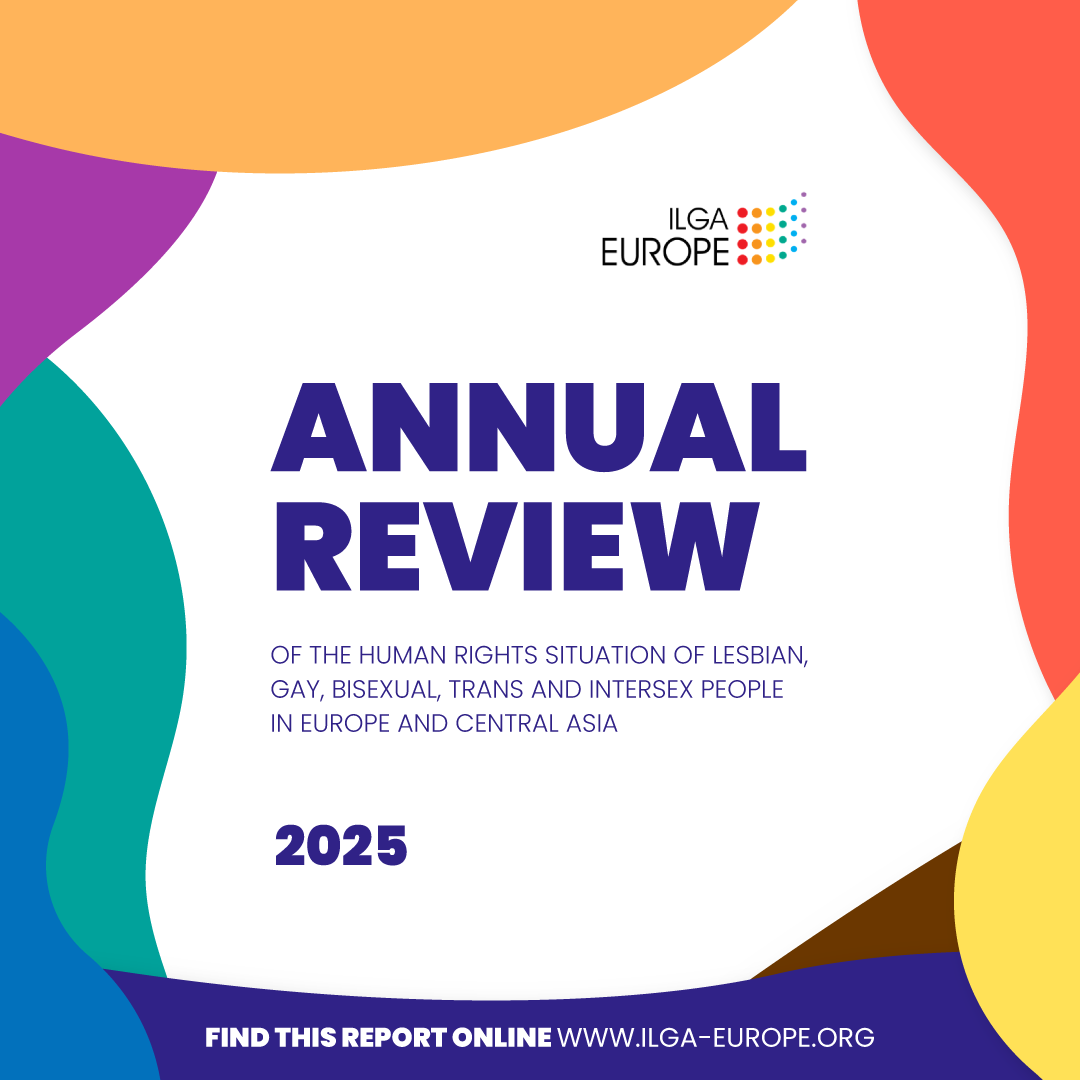New Era of Coordinated Attacks on Foundations of Fundamental Rights, European Report Finds

A major report published today identifies how LGBTI people are being weaponized to erode the foundations of freedom and democracy across Europe.
Released today, February 18, 2025, ILGA-Europe’s ‘Annual Review of the Human Right Situation of LGBTI People in Europe and Central Asia’ warns of a new era in which rising anti-LGBTI legislation threatens fundamental rights. Governments are fueling anti-LGBTI sentiment to push laws that restrict freedom of expression, association, and fair elections.
Governments are increasingly adopting tactics similar to Russia’s, forcing NGOs to register as ‘foreign funded’ to undermine their legitimacy, restrict funding, and stifle human rights activism. Known as ‘foreign agent’ laws, these measures are framed as protecting families and traditional values while often specifically targeting LGBTI NGOs. Last year in Bulgaria, Georgia, Hungary, Kyrgyzstan, and Montenegro, proposed foreign agent laws posed a direct threat to civil society.
Such legislation is enacted with or in the wake of so-called ‘LGBT propaganda’ laws that seek to criminalise visibility of LGBTI people, ban content, silence activists and restrict freedom of assembly, which have been either discussed, proposed or adopted in seven countries (Azerbaijan, Belarus, Bulgaria, Georgia, Kazakhstan, Romania, and Slovakia). These laws have been increasingly leveraged in education sectors, restricting or entirely preventing the inclusion of LGBTI issues in curricula and awareness-raising initiatives. In addition, attempts to introduce legislation excluding LGBTI topics from sex education were recorded in Bulgaria, Hungary, Italy, the Netherlands, Luxembourg, Norway, Romania, Russia and Slovakia.
In this context, LGBTI-phobic hate speech, sexism and misogyny are increasingly normalised, often fuelled by public figures, including political and religious leaders and state institutions. This is in turn driving an unprecedented surge in violence as hate crimes have reached record levels across the region.
The normalisation of hate is also providing justification for the blocking of healthcare for trans people. Andorra, Georgia, Hungary, Ireland, Moldova, Romania, Russia, and the UK have all put in place new barriers to care. Following the UK Cass Review, efforts to restrict trans healthcare for minors have emerged in Austria, France, Italy, Ireland, Poland, and the UK, putting trans lives further at risk.
As an increasing number of governments crack down, LGBTI people are being forced to flee—but Europe is closing its doors. Russia, Kyrgyzstan, and Turkey are intensifying persecution, and Turkmenistan is entrapping and torturing LGBTI individuals. Yet, many European countries, including Austria, Belgium, Bulgaria, Ireland and the UK, are denying asylum claims based on outdated, arbitrary assessments, with some officials rejecting applicants for not ‘seeming LGBTI enough.’
According to ILGA-Europe’s Executive Director, Chaber: “This report confirms what many of us have feared—we are entering a new era where LGBTI people have become the testing ground for laws that erode democracy itself. Across Europe and Central Asia, governments are using anti-LGBTI rhetoric to justify restrictions on free speech, civil society, and fair elections. What begins as an attack on LGBTI rights rapidly grows into a wider assault on the rights and freedoms of all individuals in society. This is not just an LGBTI issue; it is a crisis for human rights and democracy as a whole.”
ILGA-Europe’s Advocacy Director, Katrin Hugendubel added: “While governments are increasingly scapegoating LGBTI people to push restrictive laws, the courts both in the EU and across Europe are in turn upholding LGBTI human rights, with key judgements on procedures for LGBTI asylum seekers, anti-LGBTI hate speech, freedom of association and expression, legal gender recognition, and sexual and reproductive rights. But at this critical time, our leaders cannot simply leave the protection of human rights to the courts. Politicians at both the European and national levels must act decisively to counter the growing attacks on the cornerstones of democracy we are seeing. The normalisation of anti-LGBTI rhetoric is not just a threat to one community—it is now a proven direct assault on the democratic principles that underpin our societies.”
Further Information
Download a full analysis of the trends here
Read the ILGA-Europe’s Annual Review here
See up-to-date legislative developments in each country with ILGA-Europe’s Rainbow Map